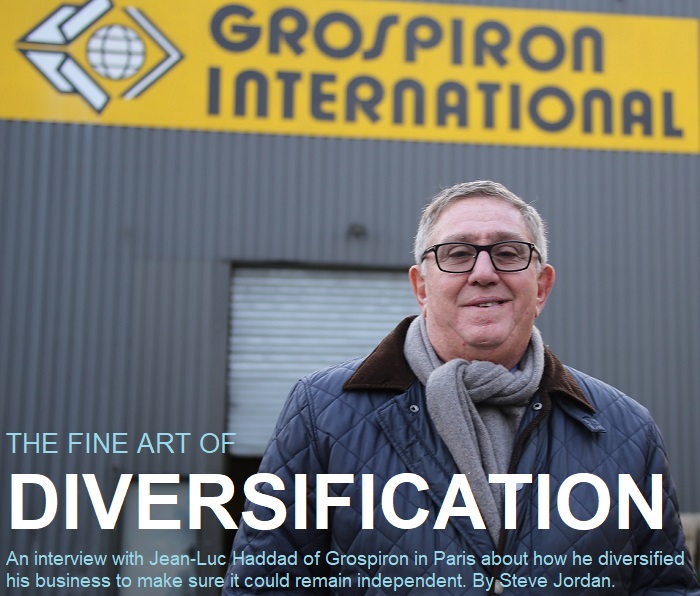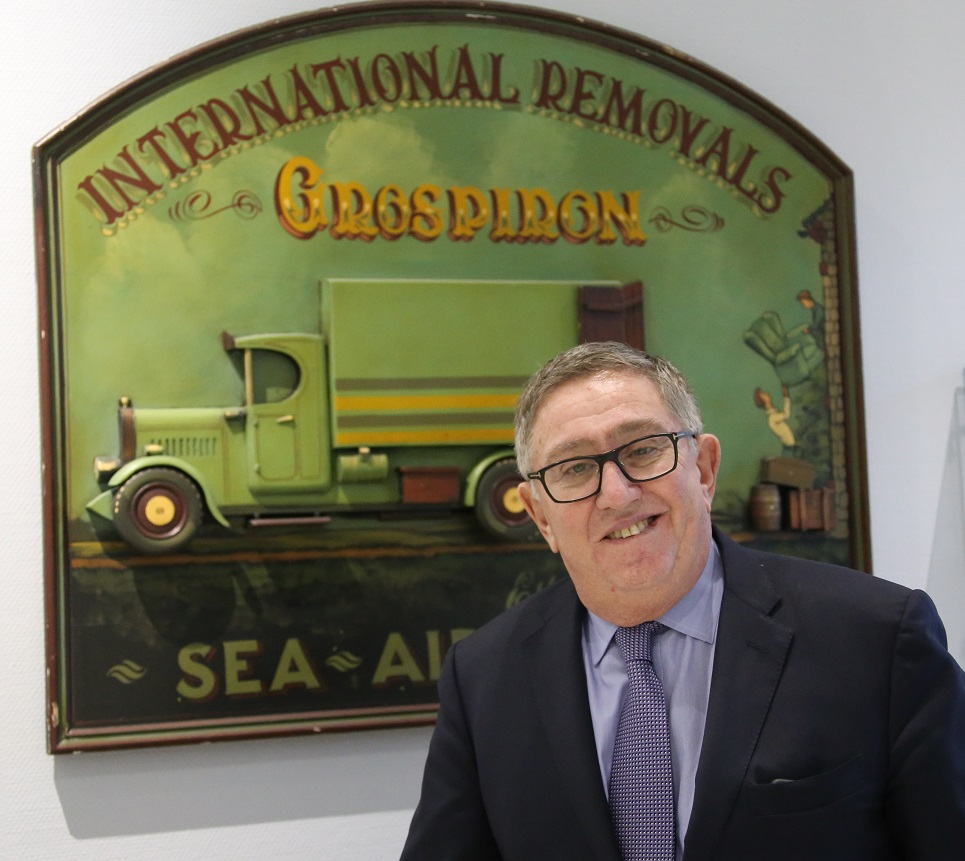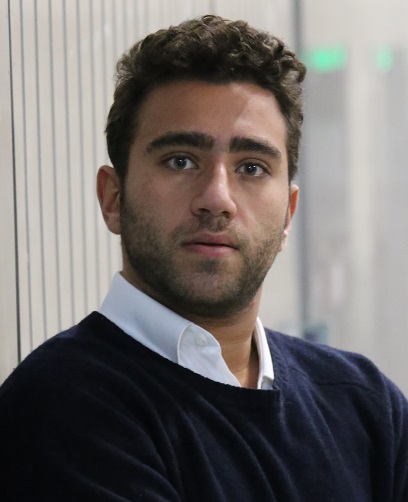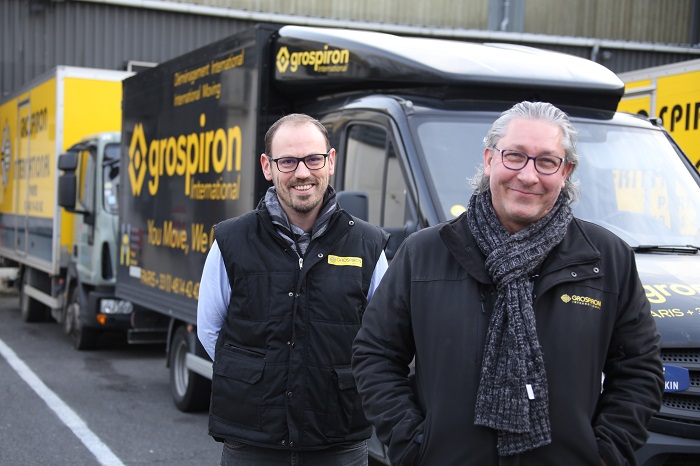An interview with Jean-Luc Haddad of Grospiron in Paris about how he diversified his business to make sure it could remain independent. By Steve Jordan.

I picked a really good time to visit Grospiron in Paris! The second week in December 2019 was when the transport workers in France were on strike, the city was gridlocked, half the population was unable to get to work and the Uber drivers were doing rather well. Still, a large helping of luck, which meant mine was one of the few Eurostar trains running from London that day, and the kind hospitality of Jean-Luc Haddad, who braved the biblical traffic to pick me up from Gare du Nord, meant all went much better than anticipated.
The drive to the Grospiron warehouse and offices near Charles de Gaulle airport took us twice as long as it should but we still arrived before the winter sun set on the very impressive facility, in time to get a few snaps. Paris is the company’s original home and the complex there includes palletised storage, case making and a new discrete area specially reserved for fine art, of which more later.
I knew, before I arrived, that Jean-Luc had a particular ‘bee in his bonnet’ so I was confident of the direction the interview would take. Less than a year ago I had seen him present on the subject of diversification, something that I knew he had embraced in many ways in his company. But even then, I was surprised to see the different ways he had diversified and the consequences for the business.
“I believe that if a moving company does not diversify it will be dead,” said Jean-Luc. “People are moving less, allowances are reducing, volumes are reducing, lump sum movers are becoming more common, and access to the moving industry is so easy that anyone can claim to be an international moving company.” He added that the independent companies were having to compete with the consolidated global organisations, which put them at a serious disadvantage.
 Jean-Luc said that he had come to that conclusion about ten years ago, following the global financial crash. That, he felt, was the watershed that saw the growth of the RMCs and the increase in compliance regulation that reduced margins and meant that it became essential to adapt. “We started simply by reducing our costs by focussing on outsourcing, but we had to do much more, we had to think about the next step.”
Jean-Luc said that he had come to that conclusion about ten years ago, following the global financial crash. That, he felt, was the watershed that saw the growth of the RMCs and the increase in compliance regulation that reduced margins and meant that it became essential to adapt. “We started simply by reducing our costs by focussing on outsourcing, but we had to do much more, we had to think about the next step.”
Branching out
The first change was to look outside Paris and outside France. Grospiron opened in Lyon and Nice, followed later by Marseille, Toulouse and Lille. International offices were opened in Hong Kong in 2015 and in both Dubai and Abu Dhabi in 2018. Jean-Luc felt that he couldn’t truly be an international organisation without overseas offices. But, of course, opening in these other markets drives business from those regions.
“It was an investment at the beginning,” said Jean-Luc. “Which comes first, the chicken or the egg? You have to be there to get the business. Now we do business in China and The Gulf with companies we would never have worked with otherwise. It’s important to be where the need is.”
And there were some other changes too. As an international organisation the working language at Grospiron is now English. The staff is now multicultural and the company enjoys celebrating festivals such as Chinese New Year, Diwali and Ramadan. “We now have people from all cultures working with us in Paris,” said Jean-Luc.
Relocation
Then came the move into relocation with the purchase of CSU (Cosmopolitan Services Unlimited) in 2013. CSU was a well-established relocation company in Paris which Jean-Luc and his team have built into one of the largest companies of its kind in France. Today, Jean-Luc says that Grospiron is largely driven by the relocation side that provides a broad range of services to its corporate customers and feeds the moving company with a steady stream of work. Although his home is in removals, Jean-Luc has no doubts about the value of relocation. “The moving company has the expenses and the troubles, the relo company has the clients and the profit.”
Importantly, the move into relocation has allowed Grospiron to remain independent with around 90% of its work being performed for its own accounts and only a small minority on behalf of RMCs. “To be profitable in the moving business you must control your client. To control the client you have to do it through relocation, not moving. Moving is a commodity.”
 Fine art
Fine art
Having tasted the benefit of diversification, Jean-Luc wanted to go further. The fine art market was next on the hit list. He considered buying an existing company but, having found there was nothing appropriate on the market, he decided to go it alone. At first he thought he would be able to merge fine art with the moving work, but this proved to be impractical. Grospiron Fine Art is run by Jean-Luc’s son, Axel, it has different management, different staff and a totally separate, secure section of the warehouse that is being prepared exclusively for storing fine art. “Including fine art with removals just doesn’t work,” said Jean-Luc. “We say in moving that a man can pack 6m3 in one day, in fine art it’s six men to pack 1m3 in a day. It’s a joke, but it’s true in principle. We’ve just finished moving an exhibition of paintings all over the world, it can take hours for three men to move one painting including packing, storage, transport and installation.”
Jean-Luc said that starting from scratch was difficult. It takes a lot of investment to break into a new market, especially when the company already has strong awareness in a different sector. “If you buy a company it comes with the goodwill. You don’t have that with something new.” Despite this, he and Axel have made the new business a success. The key, he says, is flexibility. “You need to be big enough to handle a large exhibition and small enough to be flexible. Many of the big players are not so flexible, they select their clients. We need to be able to adapt to whatever our clients want.”
Office moving
Two years ago, Grospiron expanded its office moving operations in the Paris area. This was somewhat easier to integrate requiring only the hiring of commercial moving specialists. “We can use the same crew leaders and trucks,” said Jean-Luc. “But, of course, the working hours are different with many moves taking place at the weekends, evenings and other times when the offices are quiet.”
 Ten years on, Grospiron has benefitted greatly from its focus on diversification with more recently adding records storage, document destruction and crisis management to the portfolio of services. Other related sectors will, no doubt, follow in the future. This has set up the company to be able, more easily, to withstand the pressures of the modern market. “We have constant pressure on our margins, employees are more demanding than ever before, customer service requires new skills, and we have the constant demand from the consumer to be green and manage waste,” said Jean-Luc. “We employ more people than before and work harder because you have to handle more files to make the same profit.”
Ten years on, Grospiron has benefitted greatly from its focus on diversification with more recently adding records storage, document destruction and crisis management to the portfolio of services. Other related sectors will, no doubt, follow in the future. This has set up the company to be able, more easily, to withstand the pressures of the modern market. “We have constant pressure on our margins, employees are more demanding than ever before, customer service requires new skills, and we have the constant demand from the consumer to be green and manage waste,” said Jean-Luc. “We employ more people than before and work harder because you have to handle more files to make the same profit.”
In 2017, Grospiron joined Harmony and Jean-Luc is now a member of the Harmony Board. “I like the business model,” he said, “it’s dynamic and sales oriented and fits well for us. Harmony provides us with agents around the world as demanded by our clients.”
There is an underlying reason that Jean-Luc has focussed on diversification, as alluded to earlier. It’s more than just survival, it’s about independence. Grospiron has been an independent organisation since 1840 and Jean-Luc has no plans for that to change any time soon. “Profit keeps you independent,” he explained. “Diversification keeps you profitable.”
Photos: Jean-Luc Haddad; Axel Haddad; HHGS warehouse manager, Stéphane Mandeix and operations manager for Fine Art, Vincent Bidan
Click here to read the next editor's pick.